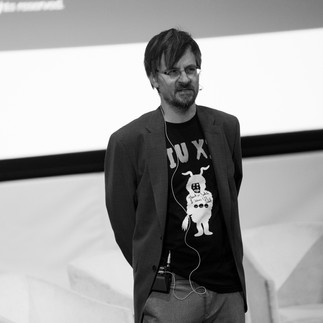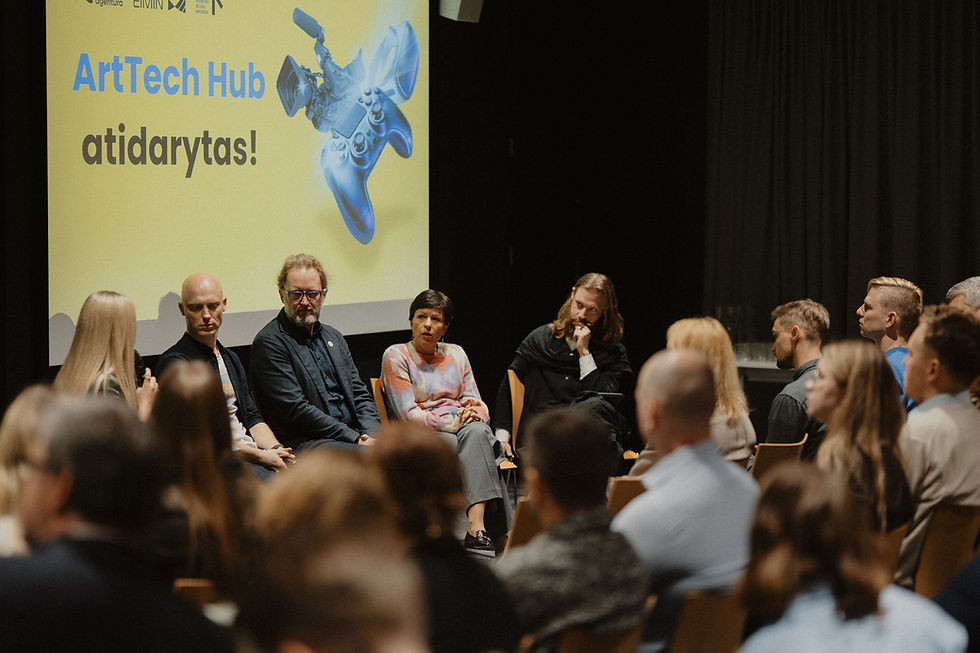THE FIRST LITHUANIAN FILM FORUM BROUGHT TOGETHER THE FILM COMMUNITY
- Mar 24, 2025
- 5 min read
Updated: Sep 11, 2025

On March 19–20 in Vilnius, the first Lithuanian Film Forum brought together more than 200 film industry representatives from across the country. The event reviewed the political, economic, and educational situation of the Lithuanian film sector, highlighted international achievements, and hosted discussions on opportunities, challenges, and perspectives. International guests, including Locarno Film Festival Artistic Director Giona A. Nazzaro, Sundance Film Festival programmer Heidi Zwicker, Denis Krupnov from London-based production and sales company Reason8 Films, Jakob Isak Nielsen, Associate Professor at Aarhus University in Denmark, and Estonian producer, Cannes NEXT curator, consultant, and film researcher Sten-Kristian Saluveer, shared their knowledge and experiences.
“The first Lithuanian Film Forum showed the great power of unity and collaboration. When film industry professionals, policymakers, and creators gather at the same table, not only ideas are born but also real solutions capable of changing the future of the industry. By acting together, we can overcome challenges, grow the potential of Lithuanian cinema both locally and internationally, create a more favorable environment for creators and audiences, and contribute to the development of film education. I believe this forum will become a permanent platform for community, innovation, and new opportunities,” said the forum’s moderator, Vilnius International Film Festival Kino Pavasaris Director Algirdas Ramaška.
POLITICAL WILL, ECONOMIC CHALLENGES, AND ACHIEVEMENTS IN FILM
The first day of the forum focused on presenting the growing Lithuanian film industry, its achievements at home and abroad, and the awards won at A-class festivals. It also addressed the challenges hindering sustainable growth, the prospects of financing film production and distribution, and the possibilities of using technology, innovation, and AI.
Among those sharing success stories were Lukas Trimonis, producer of Pietinia Kronikos, Marija Razgutė, producer of You Can’t Remember Nothing (awarded for Best Directing at Sundance), Agnė Adomėnė, producer of Villagers (created with a unique painting technique), and Lukas Verpetinskas, producer of Angelų takais, a VR film that drew over 400,000 viewers in Lithuania. Producers Živilė Gallego, Emilija Sluškonytė, and Gabija Siurbytė discussed the challenges and visions for the future of film production and distribution.
Kęstutis Drazdauskas, board member of the Baltic Film & Creative Tech Cluster, emphasized the need to view film as a universal tool for addressing social, educational, and public awareness challenges. A following discussion with representatives from the Lithuanian Film Centre, Vilnius Municipality, the Ministry of Economy and Innovation, and the Seimas Committee on Culture focused on current and potential new funding sources, as well as inter-institutional cooperation. Rūta Pilkytė, cultural advisor to the Mayor of Vilnius, presented the vision for a Lithuanian film studio, while Vytautas Juozapaitis, Deputy Chair of the Seimas Committee on Culture, stressed the need to raise cultural policy issues at the highest level, noting that every ministry should consider itself a stakeholder in cultural policy.
CINEMA VIEWERSHIP AND PIRACY
Marketing Director of Multikino Lietuva, Raimundas Bilinskas, presented results of a Lithuanian cinema health study, showing that year after year, Lithuanian films maintain strong positions at the box office. From 2019 to 2024, films such as Tadas Vidmantas’s Milijonieriaus palikimas and Pats sau milijonierius, Aurimas Valujavičius’s Irklais per Atlantą, Emilis Vėlyvis’s Piktųjų karta, and Kęstutis Gudavičius’s ReEmigrantai ranked among the top five. Family and children’s films like Inesa Kurklietytė’s Drugelio širdis and Meinardas Valkevičius’s Kakė Makė: mano filmas, as well as Giedrė Žickytė’s documentary The Jump, also attracted significant audiences.
Bilinskas noted, however, that a lack of relevant national films, especially for children, remains a challenge, alongside changes in audience habits since the pandemic and the ongoing problem of piracy.
Vytas Simanavičius, head of the Intellectual Property Protection Center (INAC), spoke about piracy, noting that despite ongoing efforts, it is increasing in Lithuania. Contributing factors include historical and economic circumstances, high internet accessibility, low incomes, limited legal platforms, a weak legal framework, insufficient enforcement, the normalization of pirated content, and VPN use. Reducing piracy, he said, requires continuous collaboration between rights holders, regulatory bodies, and other institutions, as well as integrated public education starting in schools, and consistent funding beyond project-based initiatives.
At the end of the day, Estonian innovation and technology strategist Sten-Kristian Saluveer presented global trends in audiovisual content production, distribution, and consumption, rapidly changing consumer habits, and his perspective on how the film industry must adapt to a fast-shifting technological and geopolitical environment. A central element of his talk was the extensive use of AI tools to optimize creative and technical processes.
LACK OF CONTENT FOR CHILDREN AND FILM EDUCATION
On the second day, the forum looked at the Lithuanian film ecosystem in an international context, with discussions on film education and an open floor for industry representatives to share their perspectives. Researchers Jakob Isak Nielsen and Cathrin Helen Bengesser, part of the EU Horizon-funded project CRESCINE, presented findings on similarities and differences in small EU film ecosystems, European film audience profiles, and the competitiveness of locally produced films in larger markets.
Vilma Levickaitė, head of the Film Culture Association, argued that Lithuania still lacks sufficient attention from policymakers and industry professionals to nurturing future audiences, developing their ability to choose quality content, and fostering critical viewing skills.
Vėjūnė Dūdėnienė, head of educational programs at Skalvija Cinema Centre, shared insights from the KIDS Regio study conducted in 12 European countries with nearly 400 children aged 7–11, which found that children’s viewing habits are strongly shaped by content consumed on social media.
Educator and film education expert Gintarė Gilaitienė presented research on building traditions of attending non-commercial family screenings, emphasizing the role of cinemas in better communicating the value of such screenings, building communities, and engaging with parents.
Film educator and media anthropologist Gintė Žulytė presented the European guidelines for film education, aimed at inspiring and enabling Europeans to access, enjoy, understand, create, select, research, and share cinema in all its forms throughout their lives. She stressed that film education develops broad competences including social, emotional, cognitive, creative, civic, cultural, and communication skills.
A closing discussion explored the role of the film industry in cultivating young audiences, the challenges faced by film education projects, and the expectations educators have of the industry and policymakers. A pressing issue raised was the lack of national films for children in Lithuania. Panel participants included Gintė Žulytė, cinematographer and educator Lina Margaitytė, animator and interdisciplinary artist Eva Rodz, filmmaker Marija Kavtaradze, and Simona Butrimienė, director of the Dainava cinema, with moderation by Vilma Levickaitė.
FUTURE PLANS AND INDUSTRY SUPPORT
The forum concluded with an open-mic discussion, where participants could raise important issues, make proposals, and encourage innovation and change. Organizers expressed the hope that the Lithuanian Film Forum will become an annual event, serving as a platform for discussions on a wide range of industry topics and shaping the future of Lithuanian cinema.
“The Lithuanian Film Forum 2025 was a significant step in bringing our industry’s debates into the public arena, clearly structuring key achievements and identifying the most pressing challenges. I hope that next year the event will be even more decisively focused on future strategies, directions of change, and solutions to help the entire film community grow sustainably and ambitiously,” said producer Marija Razgutė.
The Lithuanian Film Forum is organized by the Baltic Film & Creative Tech Cluster. Partners: AVAKA, Meeting Point Vilnius, Vilnius International Film Festival Kino Pavasaris, and Vilnius Municipality. Supported by: Independent Producers Association, Alliance of Author’s Cinema, Lithuanian Shorts, LMTA National Film School, Lithuanian Animation Association, Film Culture Association, Actors Guild, Women in Film & Television Lithuania (WIFT LT), film exhibitors, and other independent industry representatives. The event is co-financed by the European Union.
More about the Lithuanian Film Forum: ltkinoforumas.lt
Photo credits: Audrius Solominas, Tautvydas Stukas



















































































